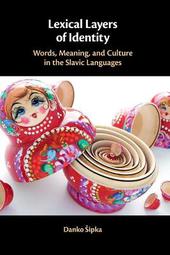
|
Lexical Layers of Identity: Words, Meaning, and Culture in the Slavic Languages
Paperback / softback
Main Details
| Title |
Lexical Layers of Identity: Words, Meaning, and Culture in the Slavic Languages
|
| Authors and Contributors |
By (author) Danko Sipka
|
| Physical Properties |
| Format:Paperback / softback | | Pages:284 | | Dimensions(mm): Height 229,Width 152 |
|
| Category/Genre | Historical and comparative linguistics
Semantics |
|---|
| ISBN/Barcode |
9781108716963
|
| Classifications | Dewey:491.8042 |
|---|
| Audience | | Professional & Vocational | |
|---|
| Illustrations |
Worked examples or Exercises; 75 Tables, black and white; 7 Line drawings, black and white
|
|
Publishing Details |
| Publisher |
Cambridge University Press
|
| Imprint |
Cambridge University Press
|
| Publication Date |
28 October 2021 |
| Publication Country |
United Kingdom
|
Description
Focusing on Slavic languages, Danko Sipka provides a systematic approach to lexical indicators of cultural identity. In contrast to existing research, which focuses heavily on syntactic and phonological approaches, Sipka's approach is novel, more systematic and encompassing, and postulates three lexical layers of cultural identity: deep, exchange, and surface. The deep layer pertains to culture-specific words, divisions, and features that are generally not subject to change and intervention. The exchange layer includes lexical markers of cultural influences resulting from lexical borrowing, which situates the speakers into various cultural circles. This layer is subject to gradual changes and some limited level of intervention from linguistic elites is possible. Finally, the surface layer encompasses the processes and consequences of lexical planning. It is subject to abrupt changes and it is shaped in constant negotiation between linguistic elites and general body of speakers.
Author Biography
Danko Sipka is a Professor of Slavic Languages and Applied Linguistics at Arizona State University. His research interests include lexicography, lexicology, morphology, and computational linguistics. His publications encompass over 150 papers and reviews as well as thirty books including Lexical Conflict (Cambridge, 2015).
|